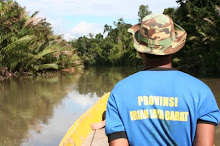Corporate news in recent weeks demonstrates the extent to which Papua’s forests have not been “returned to the people” as Governor Suebu’s pronouncements have promised. Instead, very rich investors, including Wilmar International, Rajawali Group, and the Noble Group, are carving it up.
This is the Noble Group’s first investment in oil palm – and it seems they could make millions of dollars. Analysts have suggested that PT HIP’s plantation in Sorong could be worth US$ 162 million once developed – not that the people who own the land are going to see much of that. EIA and Telapak reportedly visited landowners in PT HIP’s plantation last year, and found that 4-year-old children had been forced to sign contracts giving rights over their land to PT HIP for decades, and that landowners were paid virtually nothing to hand over their land to the company.
PT HIP is a subsidiary of the Kayu Lapis Indonesia Group, which is currently clearing forests via other subsidiaries for another plantation in the Sorong area – despite not having permits to do so.
Again, biofuels seem to be driving this deforestation (PT HIP’s plantation is not fully cleared yet – despite it already being visible from space as a scar across the Malamooi tribe’s land, as seen in the image above). Noble Group Executive Chairman Richard Elman explained the thinking: “With increasing convergence between agriculture and energy, this investment is a clean fit for the Group’s diversified portfolio.” That's nice Richard - you go and save the world.
Other corporate news featured the Rajawali Group, owned by billionaire Peter Sondakh, which already owns a 26,000 hectare plantation in Keerom, Papua. On June 11, Reuters reported that Rajawali “has … bought 70,000 hectares in the planned Merauke food estate in Indonesia's eastern Papua province, in which it will invest $400 million to plant sugar”, and that it plans to list its 200,000 hectares of plantations in Indonesia through a public offering in order to “unlock” capital with which to acquire a string of coal mining assets.
Papua Forest Eye was initially surprised to learn Rajawali had “bought” 70,000 hectares in the MIFEE project – give that in the same week the government announced they had still not agreed the land use spatial plan for Merauke… Yet, as Rajawali’s Managing Director, Darjoto Setyawan, told Reuters, “cash is king”, and Peter Sondakh has friends in high places, which can help in Indonesia
On the 31 May 2007, Andreas Harsono of the International Consortium of Investigative Journalists (ICIJ) reported that Peter Sondakh may have played a significant role in financing a successful US$1,044,147 Washington lobbying effort to re-establish Indonesia’s military relations with and IMET military aid from the U.S government. IMET (International Military Education and Training funds) contributions to Indonesia East Timor
The human rights and demographic implications of the MIFEE project have been flagged up at the UN by AMAN, Indonesia
That an Indonesian parliamentarian has recently accused Wilmar International of suspected multi-million dollar tax fraud (Rp 3.6 trillion (US$385 million)) in Indonesia Indonesia Indonesia




No comments:
Post a Comment